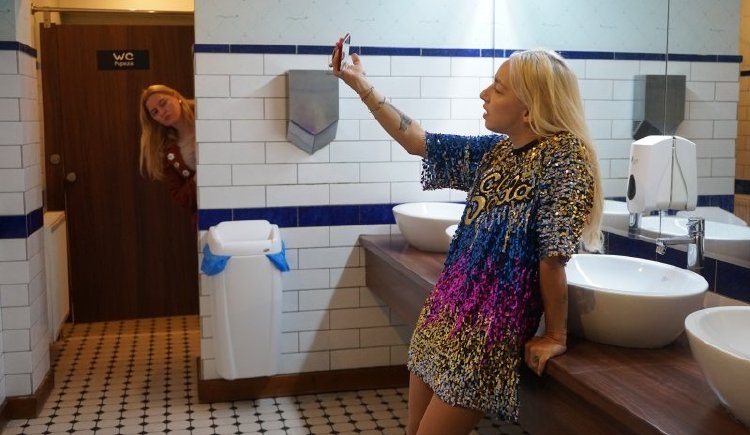Do Not Expect Too Much From the End of the World

Angela Raducani (Ilinca Manolache, "Good Luck Banging or Loony Porn") is an overworked production assistant driving around Bucharest shooting audition tapes with victims of accidents incurred on the job vying for the 500 Euros that will be paid by their former Austrian employer if they are cast in its corporate safety video. They are all being so grossly exploited, one wonders if they are any better off than Angela’s namesake, a taxi driver (Dorina Lazăr from Lucian Bratu's 1981 film "Angela merge mai departe (Angela Goes On)") during the Ceauşescu era who is now the mother of the handicapped Ovidiu Pîrsan (himself) in “Do Not Expect Too Much From the End of the World.”
Laura's Review: A-
Romanian writer/director Radu Jude’s ("Aferim!," "Bad Luck Banging or Loony Porn") blackly comic multi-media collage of a film is a caustic commentary on our times, something Angela augments with her Tik Tok persona Bobiță (herself behind a unibrowed and mustachioed filter) who makes incredibly profane commentary on everything from hanging with Andrew Tate to vulgar anecdotes on the British royal family. 'I criticize by way of extreme caricature, like Charlie Hebdo,’ Angela tells us.
The woman who rises before 6 a.m. drives across town to discover her first audition isn’t even home, having chosen to use Zoom instead. On the road again, she’ll have a bitch session with mom about drivers flaunting regulations and illegal trash burning while noting she is on the hunt for a ‘double-muzzled dog who can bark and bite at the same time.’ She’ll video Docea Marina, a single mother in a wheelchair because of a fall her employer blamed on the single sip of brandy her boss pushed on her to celebrate a birthday, then pick up mom to deal with the disinterment of her grandparents, their gravesite having been encroached upon in a land dispute with another big corporation. Before the day is over, she’ll tape another audition, listen to Angela’s husband Gyuri (László Miske, "Angela merge mai departe") declare Victor Orban a ‘man of the people,’ book a restaurant for the ‘snooty Austrians’ coming into town, stop by Uwe Boll’s set (complete with a hilariously stationary giant weevil) and convince him to join a Bobiță video, take a catnap in her car, cater and attend a production meeting, have a quickie with her lover in her cramped back seat and pick up Austrian boss Doris Goethe (Nina Hoss, "Barbara," "Tár") from the airport.
That production meeting is a highlight of absurdist comedy, Doris zoomed in on a giant screen like Big Brother as they discuss which audition tape best suits their purposes (one is too ‘freaky looking,’ another a Gypsy and even their choice, Ovidiu, can’t use his last name because it translates to ‘buttock’) while the obsequious director prattles on about lenses and filters the client clearly doesn’t care about and Angela spits in their food before serving it. A Mr. Hans Frank is introduced to tell the team ‘I have one word to say – emotion,’ before abruptly leaving. The absurdity continues when Angela picks up Doris and asks her if it is true her company has destroyed Romania’s forests only to be told it was Romania’s fault for allowing them to do so (this logic, that workers are the cause of their own exploitation, will crop up repeatedly). The film’s last act is a static shot of the safety video being shot as we watch the truth literally deconstructed around Ovidiu and his family until none of it is left.
While Jude shoots the main part of his film in 16mm black and white, an artistic choice emphasizing the dreariness of the lives he depicts, the Bobiță videos, a creation of Manolache’s that preceded her work on this film, and the safety video are in color, along with the Bratu film he frequently crosscuts with to compare the misogyny both Angelas deal with 4 decades apart. Although she isn’t seen in much of the film’s last act, Manolache steps out from behind the camera during a cut to become Bobiță, startling those who can overhear her, a running joke throughout the film. The actress is the picture of exhaustion, yet her anger and irreverent humor give the film its energy, along with her musical choices on her car’s radio. Romania’s selection for the 2024 International Oscar didn’t even progress to the short list, a real pity, perhaps a victim of its 2 hour 43 minute run time, but Radu Jude’s film is essential cinema for those who like their thoughts provoked. And it’s funny as hell.
Robin's Review: B-
Mubi released "Do Not Expect Too Much From the End of the World" in select theaters on 3/29/24, expanding in subsequent weeks. It begins streaming on Mubi on 5/3/24.

